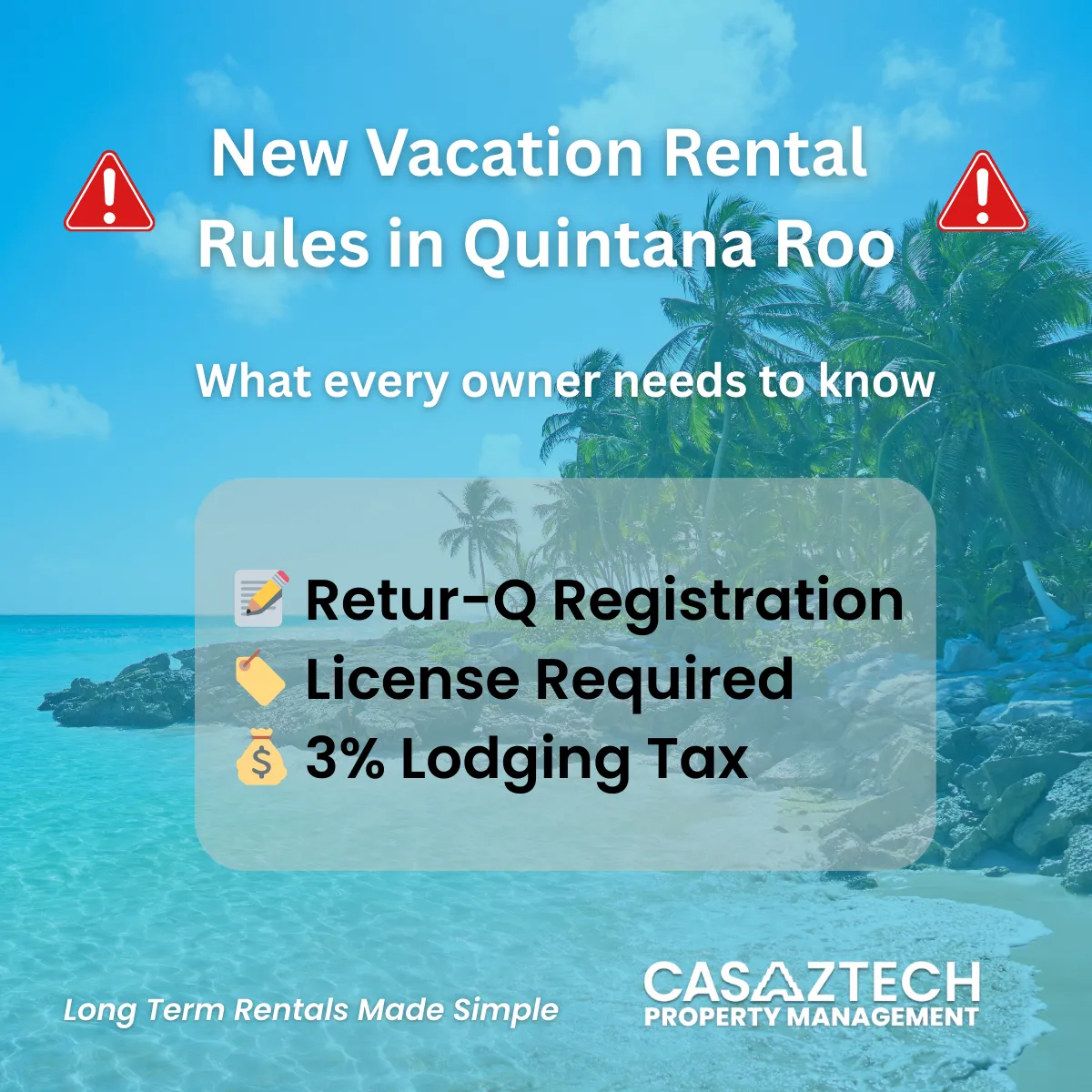
Quintana Roo’s New Vacation Rental Regulations: What Property Owners Need to Know in 2025
If you own a vacation rental in Quintana Roo, whether in Tulum, Playa del Carmen, Cancún, or Akumal, you’ve probably heard about the new wave of vacation rental regulations affecting Airbnb, Vrbo, and other short-term rental hosts.
These rules are designed to:
Improve tax compliance
Bring more oversight to the tourism industry
Help fight human trafficking and scams
Increase safety and transparency for guests
While the goals make sense, the reality for property owners is clear. Compliance now means more paperwork, higher costs, and bigger risks of fines.
At Casaztech Property Management, we focus on long-term rentals. We’ve seen how these new rules are pushing many vacation rental owners to rethink their strategy and shift to a model that gives them steady income, less oversight, and peace of mind.
Let’s look at the most important Quintana Roo vacation rental regulations you need to know in 2025.
1. Mandatory Registration on RETUR-Q
Quintana Roo requires all vacation rental properties to register on RETUR-Q, the official State Tourism Registry.
👉 What it means for owners:
Registration is required for every Airbnb or Vrbo listing
If your property isn’t listed, you could face fines of more than 100,000 pesos
In some cases, authorities can suspend your ability to operate
2. Operating License Requirement
Vacation rental owners must also obtain a State Operating License through Quintana Roo’s Tax Administration Service (SATQ).
👉 What it means for owners:
Getting and keeping this license is now part of doing business. If you don’t have it, your listing can be shut down and your income can stop.
3. Lodging Tax (ISH)
Quintana Roo enforces a 6% Lodging Tax (ISH) on all short-term rental income.
On top of that, property owners are responsible for federal taxes, including:
16% VAT (IVA)
Income Tax (ISR), reported monthly and annually
👉 What it means for owners:
Your profits shrink
If you don’t collect or remit taxes properly, you risk audits and penalties
Tax compliance is now one of the biggest costs of running a vacation rental
4. Safety and Guest Verification Rules
To fight human trafficking and protect guests, hosts now have to:
Verify the identity of all guests, especially minors
Confirm minors are related to the adults they’re staying with
Ensure tourism workers complete mandatory training programs
👉 What it means for owners:
Even if you’re hosting a small condo on Airbnb in Tulum, you still have to comply with these safety protocols. That adds time and responsibility.
5. Platform Reporting and Enforcement
Since 2024, digital platforms like Airbnb and Vrbo are required to share their listings with the state.
Authorities compare online listings against the RETUR-Q and SATQ databases. If your property isn’t registered or licensed, you can be flagged for non-compliance.
👉 What it means for owners:
You can’t fly under the radar anymore
Platforms themselves may face penalties, so they’ll likely delist your property if it’s not compliant
6. Municipal and Community Restrictions
In addition to state rules, many municipalities and HOAs in Quintana Roo are introducing their own restrictions.
For example:
Some gated communities don’t allow vacation rentals
Condominiums may add strict guest-check requirements
Local zoning rules may limit rental use
👉 What it means for owners:
Even if you’re compliant with state regulations, your community or building might still impose extra restrictions.
7. Penalties for Non-Compliance
The penalties for ignoring the rules are serious:
Fines of more than 100,000 pesos for not registering or getting a license
Suspension of your operating license, which means your rental can’t legally operate
Delisting from platforms like Airbnb or Vrbo
Tax audits, surcharges, and additional fines for failing to pay lodging, VAT, or income taxes
The bottom line: running a vacation rental in Quintana Roo isn’t simple anymore.
Why Long-Term Rentals Are the Smarter Alternative
Here’s the good news. Long-term rentals aren’t subject to these burdens.
When you rent your property for 6 to 12 months at a time, you don’t need to:
Register with RETUR-Q
Apply for a tourism operating license
Collect or remit the 6% lodging tax
Train staff under tourism compliance rules
Verify guest IDs against anti-trafficking standards
Instead, you get:
✅ Predictable monthly income
✅ Stable tenants with less turnover
✅ Lower risk of fines or audits
✅ A truly passive investment
How Casaztech Property Management Helps
At Casaztech Property Management, we specialize in long-term rental management in Quintana Roo.
Here’s how we make it simple:
🔒 Same-day tenant background checks with bilingual reports
📅 6 to 12 month lease placements for stability
🛠️ Full property management, including maintenance, communication, and rent collection
🌐 Transparent reporting through our Owner Portal and monthly updates
Whether you’re tired of chasing bookings or already planning to exit the short-term market, we’ll guide you step by step.
Conclusion: Stability Over Stress
Quintana Roo’s new vacation rental regulations are here to stay, and the effort, cost, and risk of staying compliant will only grow.
Long-term rentals give you a way to keep your property profitable without the red tape.
At Casaztech Property Management, we help owners earn steady income with happy tenants and peace of mind.
📅 Ready to see if long-term rentals are right for you?
👉 [Schedule a Free Consultation with Casaztech Property Management]